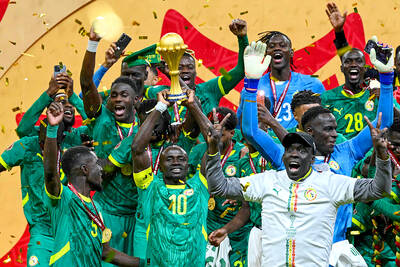In 2002, former LA Dodgers and current La New Bears star Chen Chin-feng (陳金鋒) became the first Taiwanese baseball player to don a Major League uniform. Shortly thereafter, the first four Taiwanese players signed to MLB contracts — including Chen, Yankees starter Wang Chien-ming (王建民), Royals pitcher Tsao Chin-hui (曹錦輝) and Dodgers reliever Kuo Hong-chih (郭泓志) — all earned spots on professional clubs.
The success of the first four Taiwanese signings — with Dodgers shortstop Hu Chin-lung (胡金龍) following in their footsteps shortly afterwards — has resulted in a multiplying number of MLB scouts hired in the quest to recruit Taiwan’s next wave of talent. The Minnesota Twins, Texas Rangers, Cleveland Indians and Detroit Tigers have all added part-time scouts within the last year, and more are likely on the way.
At least 10 of the 30 MLB teams now have part-time or full-time scouts residing in Taiwan, working on a continuing basis to try to find the next big signing.

PHOTO: AP
These scouts are usually reinforced by international cross-checkers who come through periodically during major tournaments, as the MLB teams’ increasing scrutiny of Taiwan generates increasingly fierce competition for talent here.
In addition to growing competition from their US peers, Major League teams scouting in Taiwan have to contend with international competitors as well.
Japanese professional teams have far more flexible guidelines regarding free-agent signings under the age of 16, while MLB rules compel teams to wait until players are 16 (or in certain cases 17) before they can offer them contracts.
Rumor has it that certain Japanese teams begin scouting players as early as elementary school — especially in eastern Taiwan, where the majority of the nation’s baseball talent originates — and have signed a number of top Taiwanese prospects well before their 16th birthday.
Seattle Mariners scout Jamey Storvick, who began scouting Taiwan in 1999, said he believes he was the only scout living in Taiwan on a permanent basis when the gold rush started. When he started out, there were only six to eight teams scouting the country intermittently, with a few local scouts helping out here and there.
“In the late 90s, interest in Taiwan got hot as a group of three solid arms came out of here in a short period of time,” he said, referring to Wang, Kuo and Tsao, whose electric fastball drew huge attention from MLB teams.
The salad days of the late 90s appear to be over, however, forcing MLB scouts residing in Taiwan to dig deeper and become more resourceful in their search for prospects.
In certain instances, unfortunately, this has meant stretching the boundaries of acceptable protocol in order to remain competitive and ensure their prospects aren’t snatched up by other clubs.
Rumors of illegal signings, teams hiding players and hidden contracts abound, as well as whispers of a maze of secret arrangements between scouts and agents that further alter the landscape of negotiations and player signings.
To make matters more complicated, some scouts in Taiwan lament certain coaches’ overuse of pitchers, citing an increased risk of injury to their coveted prospects before they can make the jump overseas.
Despite these hurdles and strategic advantages held by Japanese clubs, Taiwan is still viewed as a top target for MLB scouting departments because of the high level of play and organization, and the passion for the game found among players, fans and coaches.
Storvick believes that as players who have gone abroad and learned from the US return to Taiwan, it can only mean good things for the future of Taiwanese player development.
“Players who went pro to other countries will come back and bring [a lot of] knowledge back to the game in Taiwan. It can only get better when that starts happening,” he said.
Regardless of the direction the game takes, there will be no lack of competition bidding for the right to sign the next generation of young Taiwanese players hungry for their shot on the game’s biggest stage.
Jackson Broder is a scout for a Major League franchise.

The Philadelphia 76ers, fueled by 36 points from Tyrese Maxey and a triple-double from Joel Embiid, on Thursday beat the Houston Rockets 128-122 in an NBA overtime thriller. Cameroonian big man Embiid scored 32 points, grabbed 15 rebounds and handed out 10 assists, posting the ninth triple-double of his career to help the Sixers end the Rockets’ three-game winning streak. Rockets star Kevin Durant scored 36 points and Amen Thompson added 17, but Thompson was scoreless in the fourth quarter. Even so, the Rockets led by nine midway through the final frame, Maxey tying it at 115-115 with 40.1 seconds left. Durant missed a

MARRED FINAL: As most of Senegalese players walked off the pitch after a controversial decision, some supporters threw objects and attempted to get onto the pitch Senegal on Sunday won the Africa Cup of Nations (AFCON) as Pape Gueye’s extra-time winner sunk hosts Morocco 1-0 after a chaotic final that saw the eventual champions storm off the pitch late in the game. Brahim Diaz could have won the trophy for Morocco with a controversial spot-kick in the 24th minute of added time at the end of normal time as ugly scenes broke out in the stands. However, Senegal goalkeeper Edouard Mendy easily saved the weak attempted “Panenka” chip by the Real Madrid winger, who was clearly distracted by the long delay that followed the penalty award.

Qatar’s Nasser al-Attiyah on Saturday secured his sixth Dakar Rally car title in Saudi Arabia with Luciano Benavides scraping home by two seconds to claim the motorbike title. “We’ve worked very hard since last year. I might not be showing much emotion yet, but it’s there, deep down. We are so happy to win,” al-Attiyah said at the finish. Al-Attiyah, at the wheel of a Dacia, only had to avoid a final day slip-up to top the podium after bringing his career tally of stage wins to 50 on Friday. The 55-year-old, who took clay pigeon shooting bronze at the

Tobias Harris on Monday scored 25 points as the Detroit Pistons held off the Boston Celtics to score a 104-103 victory in their top-of-the-table Eastern Conference showdown. Harris was one of four Detroit players to finish in double figures, with Jalen Duren adding 18 points and point guard Cade Cunningham scoring 16 points with 14 assists. The win sees Detroit extend their lead at the top of the Eastern Conference to 31-10, 5.5 games ahead of second-placed Boston, who fell to 26-16 with the defeat. Jaylen Brown led the Celtics scoring with 32 points and almost snatched victory in the